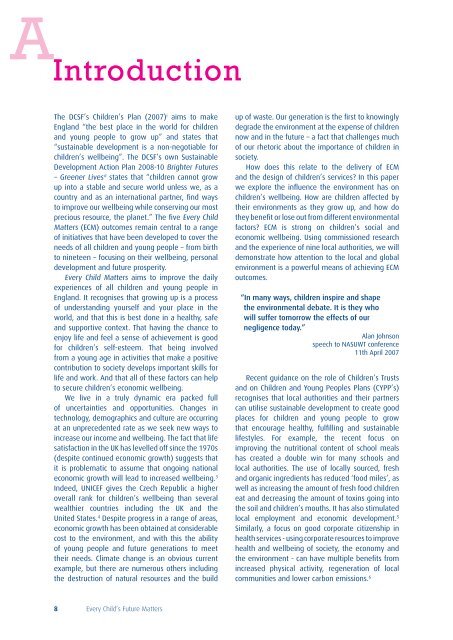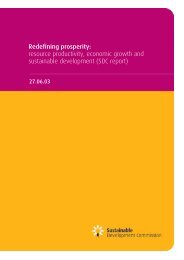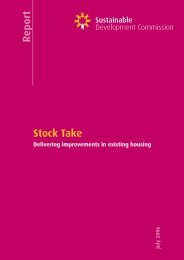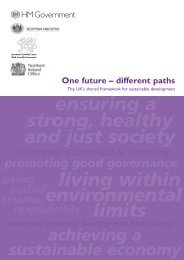Every Child's Future Matters - Sustainable Development Commission
Every Child's Future Matters - Sustainable Development Commission
Every Child's Future Matters - Sustainable Development Commission
You also want an ePaper? Increase the reach of your titles
YUMPU automatically turns print PDFs into web optimized ePapers that Google loves.
A Introduction<br />
The DCSF’s Children’s Plan (2007) i aims to make<br />
England “the best place in the world for children<br />
and young people to grow up” and states that<br />
“sustainable development is a non-negotiable for<br />
children’s wellbeing”. The DCSF’s own <strong>Sustainable</strong><br />
<strong>Development</strong> Action Plan 2008-10 Brighter <strong>Future</strong>s<br />
– Greener Lives ii states that “children cannot grow<br />
up into a stable and secure world unless we, as a<br />
country and as an international partner, find ways<br />
to improve our wellbeing while conserving our most<br />
precious resource, the planet.” The five <strong>Every</strong> Child<br />
<strong>Matters</strong> (ECM) outcomes remain central to a range<br />
of initiatives that have been developed to cover the<br />
needs of all children and young people – from birth<br />
to nineteen – focusing on their wellbeing, personal<br />
development and future prosperity.<br />
<strong>Every</strong> Child <strong>Matters</strong> aims to improve the daily<br />
experiences of all children and young people in<br />
England. It recognises that growing up is a process<br />
of understanding yourself and your place in the<br />
world, and that this is best done in a healthy, safe<br />
and supportive context. That having the chance to<br />
enjoy life and feel a sense of achievement is good<br />
for children’s self-esteem. That being involved<br />
from a young age in activities that make a positive<br />
contribution to society develops important skills for<br />
life and work. And that all of these factors can help<br />
to secure children’s economic wellbeing.<br />
We live in a truly dynamic era packed full<br />
of uncertainties and opportunities. Changes in<br />
technology, demographics and culture are occurring<br />
at an unprecedented rate as we seek new ways to<br />
increase our income and wellbeing. The fact that life<br />
satisfaction in the UK has levelled off since the 1970s<br />
(despite continued economic growth) suggests that<br />
it is problematic to assume that ongoing national<br />
economic growth will lead to increased wellbeing. 3<br />
Indeed, UNICEF gives the Czech Republic a higher<br />
overall rank for children’s wellbeing than several<br />
wealthier countries including the UK and the<br />
United States. 4 Despite progress in a range of areas,<br />
economic growth has been obtained at considerable<br />
cost to the environment, and with this the ability<br />
of young people and future generations to meet<br />
their needs. Climate change is an obvious current<br />
example, but there are numerous others including<br />
the destruction of natural resources and the build<br />
up of waste. Our generation is the first to knowingly<br />
degrade the environment at the expense of children<br />
now and in the future – a fact that challenges much<br />
of our rhetoric about the importance of children in<br />
society.<br />
How does this relate to the delivery of ECM<br />
and the design of children’s services? In this paper<br />
we explore the influence the environment has on<br />
children’s wellbeing. How are children affected by<br />
their environments as they grow up, and how do<br />
they benefit or lose out from different environmental<br />
factors? ECM is strong on children’s social and<br />
economic wellbeing. Using commissioned research<br />
and the experience of nine local authorities, we will<br />
demonstrate how attention to the local and global<br />
environment is a powerful means of achieving ECM<br />
outcomes.<br />
“In many ways, children inspire and shape<br />
the environmental debate. It is they who<br />
will suffer tomorrow the effects of our<br />
negligence today.”<br />
Alan Johnson<br />
speech to NASUWT conference<br />
11th April 2007<br />
Recent guidance on the role of Children’s Trusts<br />
and on Children and Young Peoples Plans (CYPP’s)<br />
recognises that local authorities and their partners<br />
can utilise sustainable development to create good<br />
places for children and young people to grow<br />
that encourage healthy, fulfilling and sustainable<br />
lifestyles. For example, the recent focus on<br />
improving the nutritional content of school meals<br />
has created a double win for many schools and<br />
local authorities. The use of locally sourced, fresh<br />
and organic ingredients has reduced ‘food miles’, as<br />
well as increasing the amount of fresh food children<br />
eat and decreasing the amount of toxins going into<br />
the soil and children’s mouths. It has also stimulated<br />
local employment and economic development. 5<br />
Similarly, a focus on good corporate citizenship in<br />
health services - using corporate resources to improve<br />
health and wellbeing of society, the economy and<br />
the environment - can have multiple benefits from<br />
increased physical activity, regeneration of local<br />
communities and lower carbon emissions. 6<br />
8 <strong>Every</strong> Child’s <strong>Future</strong> <strong>Matters</strong>








